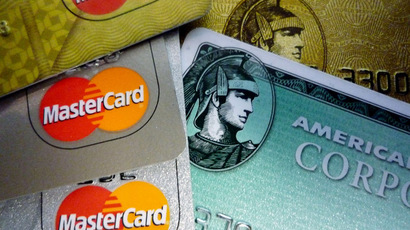US government made at least $100 bn in improper payments last year

The US government estimates that it made about $100 billion in improper payments last year to those not entitled to receive them. The Medicare program only accounted for about half of the amount that was erroneously doled out.
Congressional investigators believe the number of inaccurate payments could be even higher. The House Oversight Subcommittee on Government Operations is scheduled to hold a hearing on Wednesday afternoon regarding the improprieties.
"Nobody knows exactly how much taxpayer money is wasted through improper payments, but the federal government's own astounding estimate is more than half a trillion dollars over the past five years," said Rep. John Mica, chair of the subcommittee. "The fact is, improper payments are staggeringly high in programs designed to help those most in need — children, seniors and low-income families."
The total of inappropriate awards is down from a peak in 2010 of $121 billion.
Federal agencies are required to provide annual estimates on improper payments they offer, including overpayments, underpayments, payments to the wrong recipient, and payments made with incorrect documentation.
Improper government payments are often the result of clerical errors or mistakes in awarding benefits without proper verification, though some are the result of fraud.
In 2013, federal agencies made $97 billion in overpayments, according to government estimates. Agencies retrieved over $22 billion in overpayments last year.
Underpayments in 2013 came out to about $9 billion.
The Obama administration has worked to lower the amount of improper payments in recent years, according to Beth Cobert, deputy director of the White House budget office.
"We have strengthened accountability and transparency, saving the American people money while improving the fiscal responsibility of federal programs," Cobert said in a prepared statement for Wednesday's hearing, according to AP. "We are pleased with this progress, but know that we have more work to do in this area."
Yet a new report by the Government Accountability Office (GAO), the investigative body of Congress, questions the accuracy of agency tallies.
"The federal government is unable to determine the full extent to which improper payments occur and reasonably assure that appropriate actions are taken to reduce them," Beryl H. Davis, the GAO’s director of financial management, said in prepared testimony for Wednesday's hearing.
Some agencies don’t have accurate estimates for programs prone to improprieties, Davis said, based on complicated accounting requirements and federal-state partnerships in allocating payments. For instance, the US Health and Human Services Department reported that it cannot force states to offer estimates for the Temporary Assistance for Needy Families program, which is administered by each state individually.
Medicare health insurance programs for the elderly made up around $50 billion in improper payments in the 2013 budget year, far more than any other government program.
Most Medicare payments figured to be inaccurate were offered without proper documentation, according to Shantanu Agrawal, deputy administrator for the Centers for Medicare & Medicaid Services. At times, the documentation did not verify that services were even medically necessary.
"Payments deemed 'improper' under these circumstances tend to be the result of documentation and coding errors made by the provider as opposed to payments made for inappropriate claims," Agrawal said in prepared testimony for Wednesday's hearing.
The earned income tax credit, which provides tax refunds to the working poor, was responsible for $14.5 billion in improper payments. That total is 24 percent of all payments in the program.
Medicaid, a federal and state partnership that offers health care for the poorest Americans, was responsible for $14.4 billion in erroneous payments, down from $23 billion in 2010.
Nine percent – or $6.2 billion – of unemployment insurance payments were inaccurately issued.
Supplemental Security Income, a disability program for the poor managed by the Social Security Administration, made $4.3 billion in improper payments.














